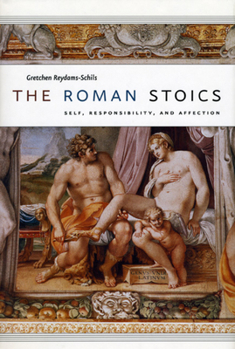The Roman Stoics: Self, Responsibility, and Affection
Select Format
Select Condition 
Book Overview
Roman Stoics of the imperial period developed a distinctive model of social ethics, one which adapted the ideal philosophical life to existing communities and everyday societal values. Gretchen Reydams-Schils's innovative book shows how these Romans--including such philosophers as Marcus Aurelius, Seneca, Hierocles, and Epictetus--applied their distinct brand of social ethics to daily relations and responsibilities, creating an effective model of involvement and ethical behavior in the classical world. The Roman Stoics reexamines the philosophical basis that instructed social practice in friendship, marriage, parenting, and community life. From this analysis, Stoics emerge as neither cold nor detached, as the stereotype has it, but all too aware of their human weaknesses. In a valuable contribution to current discussions in the humanities on identity, autonomy, and altruism, Reydams-Schils ultimately conveys the wisdom of Stoics to the citizens of modern society.
Format:Paperback
Language:English
ISBN:0226710262
ISBN13:9780226710266
Release Date:May 2006
Publisher:University of Chicago Press
Length:224 Pages
Weight:0.69 lbs.
Dimensions:0.5" x 6.5" x 9.0"
Related Subjects
PhilosophyCustomer Reviews
1 rating
Late Stoicism, contemporary feminism and the philosophy of everyday living.
Published by Thriftbooks.com User , 14 years ago
This book made me want to write two or three reviews about it. On one hand it is a careful, lucid investigation into the ways the Roman Stoics tried to put their philosophical ideas into the practise of their politics, their friendships, their marriages and their parenting. On the other hand, it also exemplifies several of the ways in which I think overtly feminist scholarship has deepened our understanding of the past both philosophically and as pure history. A scholar/philosopher like a Martha Nussbaum or a Gretchen Reydams-Schils reacts differently while reading the central texts of Western culture. Feminists bring different sorts of awarenesses to those readings, they ask different questions and they look into ignored corners. This has been a very good thing. The humanities should embrace many different approaches and methodologies to their fields. There is much to be learned from the great man approach to history and from the social historians. There is much to be learned from a Straussian reading of the Platonic corpus and from a feminist reading. Life is not neat. Humans are not very neat. Our humanities should be a bit messy as well. Enough of my tangent. Back to the book. Reydams-Schils (hereafter RS) focuses her reading of Musonius Rufus, Seneca, Marcus Aurelius on the Stoic notion of the self as the site of mediating between the universal strictures of their theory and the particularities of their lives. In her first chapter, RS outlines the late Stoic notion of the self. Her thesis is that it is part of the most unified theory of soul of that period of philosophy. As with most of the philosophies of the Hellenistic period, the fundamentals of the theory was based in their view of nature and how that self was aligned to nature. From this arose their ethics and politics. In her second chapter, she explores how those ethics are embedded in the Stoic ideals of community and their sense of duties involved with our various social roles. She sketches out the beginning of her reading of the Stoics as parents and spouses. In her next chapter, she discusses the politics derived from this theory. One of the most fascinating aspects of the history of Stoicism is the fact that three of the major theorists RS discusses (Cicero, Seneca and Marcus Aurelius) were major political players in their time. Marcus Aurelius, of course, was an emperor. The Stoic writers were thus able to discuss their struggles which actualizing their theories in the actual politics of their day. A couple of points about this. Their philosophies made this men citizens dual citizens. They were Romans, of course, but they were also citizens of the universal community of gods and men (Cosmopolis). Secondly, they were very focused on improvement not on perfection. Theirs was not a philosophy that would lead to wholesale changes, let alone revolution. Change had to occur through reason, one does not force change. Obviously, this leads to a fairly conservative politics and one t






